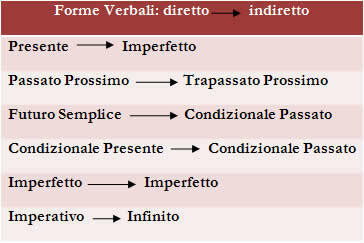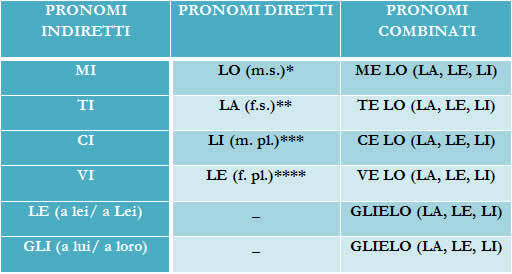When speaking indirectly to the south, it is important to have in test the use to report the parole dette of the unaltra persona. / When talking about indirect speech it is important to keep in mind that we use it to report the words spoken by someone else.
Obviously, it leaves when you pass from the dicorso diretto all’indiretto ci sono diversi cambi o trasformazioni come: / Obviously, you already know that when you move from direct to indirect discourse, there are several changes or transformations such as:
 Si cambiano i tempi and modi del verb. / The tenses and modes of the verb change;
Si cambiano i tempi and modi del verb. / The tenses and modes of the verb change;
 Si cambian le persone; / People change;
Si cambian le persone; / People change;
 Si cambiano gli avverbi di tempo e luogo; / Adverbs of time and place change;
Si cambiano gli avverbi di tempo e luogo; / Adverbs of time and place change;
 Si cambian i pronomi; / Change the pronouns;
Si cambian i pronomi; / Change the pronouns;
 Si cambiano i pronomi dismostrativi e possessivi; / The demonstrative and possessive pronouns are changed;
Si cambiano i pronomi dismostrativi e possessivi; / The demonstrative and possessive pronouns are changed;
Al testo meet me in general mode, i cambi dei tempi and modi del verb, attraverso gli esempi. It is possible to capire altri punti sull'argomento accedendo i following testi al site: " Contrast tra i discorsi: diretto and indiretto" and "Capendo il discourso indirect”. / In the text you will know, in general, the changes in the verb modes and tenses, through examples. It is possible to understand other points on the subject by accessing the following texts on the website: “Contrasto tra i discorsi: diretto e indiretto” and “Capendo il discorso indiretto”.
See sotto alcuni esempi di verbi che caratterizzano the introduction of a sentence al discorso indirect: / See below some examples of verbs that characterize or introduce a phrase in indirect speech:
Do not stop now... There's more after the advertising ;)

The table is followed by you to show succedono i cambi dei modi and tempi verbali dal discorso diretto all’indiretto. Osserva con attenzione alcuni esempi!/ The table that follows will show you how changes in verbal modes and tenses from direct to indirect speech occur. Look carefully at some examples!
Esempi:/ Examples:
1) Carlo ha eclamato: «Ho parlato la verità!” (diretto disagreement) / Carlo exclaimed:
- I said the truth! (direct speech).
2) Carlo ha esclamato che he aveva parlato la verita. (diretto disagreement) ./ "Carlo exclaimed that he had spoken the truth."
3) Maria urla al gatto: «Sta’ zitto!» (diretto discord) / Maria screams at the cat:
- Be quiet! (direct speech).
4) Maria urla al gatto di stare zitto. (indiretto discord) / Maria screamed at the cat to be silent. (indirect speech).
5) La donna conferma: «you invierò l’e-mail fra poco.» (diretto disagreement) / The lady confirms:
- In a little while I'll send you the e-mail. (direct speech).
6) "La donna confermava che you invierà l'e-mail in quel moment. "/" The girl, at that moment, confirmed that she will send you the e-mail. "(indirect speech).
7) Gianlucca ha detto: «Fuori tutti!» (direct discord) / Gianlucca said:
- Everyone out! (direct speech).
8) Gianlucca ha detto di walk tutti fuori di lì. (indiretto disagreement) / Gianlucca had told everyone to get out of there. (indirect speech).
Isabela Reis de Paula
Brazil School Collaborator
Graduated in Letters with Qualification in Portuguese and Italian
By the Federal University of Rio de Janeiro - UFRJ
Would you like to reference this text in a school or academic work? Look:
PAULA, Isabela Reis de. "I cambi dei modi e tempi verbali dal discorso diretto all’indiretto"; Brazil School. Available in: https://brasilescola.uol.com.br/italiano/i-cambi-dei-modi-tempi-verbali-dal-discorso-diretto.htm. Accessed on June 29, 2021.


